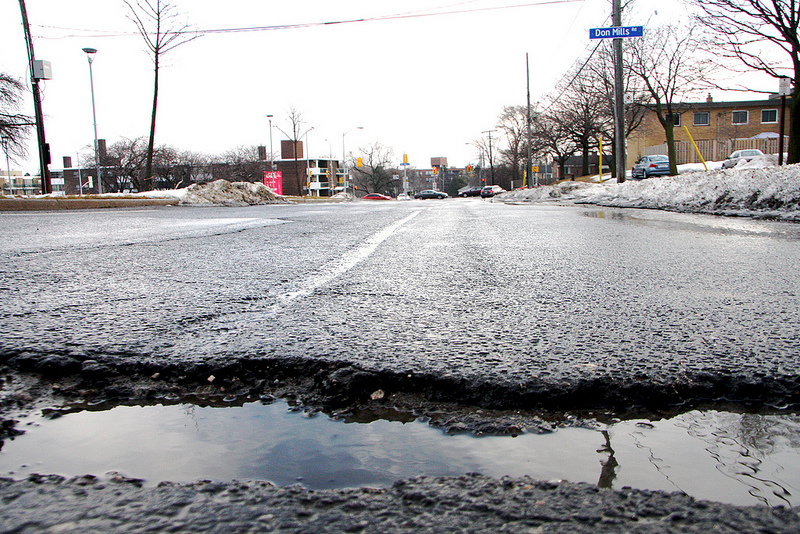I was driving around town recently and gradually realized that I was not as aware of the ice and snow that had been coating our roads for several weeks. Previously, I had been driving defensively on our treacherous streets, fearful of skidding – or of being skidded into by another vehicle. Miraculously the temperatures sneaked above zero on this day, making it seem almost tropical in comparison to what we’d become used to this winter (it’s all relative, isn’t it?). The salt and sand that the trucks dumped on the streets finally had melted the vehicular ice-skating rink. The second blast of the infamous Polar Vortex had relented enough to make me think – or wish – that the extreme challenges of this unusual winter were behind us.
It was then that I abruptly realized the pavement under my car, instead of feeling like a lake of frozen liquid, was bumpy and rutted. The melted snow had left in its wake another challenge for drivers. Potholes… potholes of all sizes, shapes, and depths. Some were mere bumps; others felt like craters. My tires began to sink into deep crevices. Some were visible and could be circumvented by changing lanes. Others came upon me abruptly and suddenly.
 The repeated ravages of freezing and thawing roads that left many drivers with flat tires, bent tire rims, and hefty towing charges morphed into my thinking about the presentation on Managing Your Performance Fears that I was scheduled to give the next day. As I do with seemingly random thoughts (that turn out not to be random), I let myself associate to whatever floated into my mind. I knew that something could emerge that would make sense of what my mind was working on unconsciously – even though at the moment it was unclear to me. Consciously, I just wanted to avoid the potholes.
The repeated ravages of freezing and thawing roads that left many drivers with flat tires, bent tire rims, and hefty towing charges morphed into my thinking about the presentation on Managing Your Performance Fears that I was scheduled to give the next day. As I do with seemingly random thoughts (that turn out not to be random), I let myself associate to whatever floated into my mind. I knew that something could emerge that would make sense of what my mind was working on unconsciously – even though at the moment it was unclear to me. Consciously, I just wanted to avoid the potholes.
Just prior to venturing out, I had been preparing my talk on performance anxiety for the Ann Arbor Chapter of the American Guild of Organists (AAAGO). The Dean of the Guild, Dr. Timothy Huth had been interviewed on WRCJ radio about the program earlier in the day by Dave Wagner, organist and announcer extraordinare. I had received several e mails and Facebook messages from listeners. (Thanks Tim and Dave!!) I was feeling very pleased that mental health had been promoted and that musicians were leading the way in addressing this topic at their Conference the following morning. I was looking forward to sharing my work with those who attended.
As my thoughts continued, I hit a pothole. Fortunately, my car and I escaped in tact. Jarred from my mental and optical illusion about driving on dry roads, I began to understand a connection between potholes and the topic of performance anxiety. (Need I remind you that no thought, however irrelevant it may seem at the time, is wasted. Let your mind associate!)
One minute I’m driving along, feeling safe. The next minute I was jolted by a bump that I didn’t foresee. These roads certainly weren’t predictable, even when I felt clear sailing was ahead. This was a similar feeling having performance anxiety. You are prepared, your performance is going fine. You feel good about yourself. Everything seems to be working. Then suddenly, when least expected, you experience a sinking feeling– you can’t remember the next passage, your fingers go to the wrong notes, you have a memory slip. Sometimes, you panic. It becomes as difficult to get around the notes as it is to get around the sinkholes in the streets. You hit a musical pothole.
 This is one of the topics I emphasized at the AAAGO Conference. Public performance carries with it an element of unpredictability – no one is immune including the most talented, prepared performer. This unpredictability also provides the positive electricity that makes public performing unlike any other experience. But unpredictability also creates stress and anxiety for the performer who feels that a performance must be perfect or everything is a failure – including one’s self.
This is one of the topics I emphasized at the AAAGO Conference. Public performance carries with it an element of unpredictability – no one is immune including the most talented, prepared performer. This unpredictability also provides the positive electricity that makes public performing unlike any other experience. But unpredictability also creates stress and anxiety for the performer who feels that a performance must be perfect or everything is a failure – including one’s self.
Unquestionably, one’s self-esteem is bound up in public performing. You put your entire self on the line – not just your talent for music, or your writing, or your speaking. Performers of all kinds dread THE pothole accident – the unpredictable slip, the panic, the mind blanking, the forgetting what comes next. Many performer’s dreams often find them being naked in front of others – exposing their perceived inadequacy, helplessness, and smallness. These feelings are humiliating and embarrassing.
One thing that is helpful for anticipatory or actual performance potholes is to realize that there is no such thing as a perfect performance. The idea of perfection exists in our wishes, not in reality. Everyone is human. Accidents do happen. Self-esteem is challenged. But accidents need not undermine positive feelings about ourselves and our abilities.
One of the people at the Conference yesterday wrote an unsolicited review following the presentation. Nathan Mondry, a Senior in piano performance at the University of Michigan School of Music, Theater, and Dance has given me permission to quote him. The below is excerpted from his extended comments.
“I attended the “Performance Anxiety: Managing Your Musical Fears” workshop in an interesting state; having just given a solo recital a week before, the topic was fresh on my mind. It’s hard for me to judge my performance anxieties relative to other people, but thinking about my most recent concert, I generally combated my fears as they came. However, there were still a few moments while performing when I felt that the wheels could have fallen off and derailed everything. These concerns, which almost never popped up in high school, have been a struggle to deal with in college. What was really nice to realize through Julie’s presentation is that my progress in addressing my performance anxiety is not just in my head.
The main thing I took from this is that stage fright often comes where there is a feeling of helplessness inside of you, since when something goes wrong, you imagine no one can come to your aid. Of course, that’s pretty much true for a solo recital; I knew going into my recital that if I screwed up and couldn’t remember a song, there would not be someone from the audience ready to fill in. However, as Dr. Nagel pointed out, musicians who feel as though they can’t succeed on the stage suffer greatly because they feel it says volumes about themselves as people as well, when that does not have to be the case. My performances became far more fun and less scary for me when I began to tell myself that no matter what happens on the stage, people will still love me, and my performances contain thousands of moments to add extra joy to people’s lives, so who cares if I miss a couple? When it’s all said and done, someone will be there to hug me.
I think the best thing about it was that it reminded to never ignore my anxieties. You can only deal with stage fright when you recognize that it is a part of life, and everyone has it to varying degrees. There was a picture Julie showed that said, “Stressed is desserts spelled backwards.” Going forward, I think I will remember to savor the stress more, because once it is served, the results will be far more delicious.”
The best preparation for a performance is not only to practice (of course!) but to develop an attitude of pleasure and adventure. You can prepare for performance potholes on stage and in life by developing a “jam plan” – a way to move on and continue your performance without becoming derailed. Develop a recovery plan should you find yourself in a pothole. Do not judge yourself negatively. Realize you are human and your audience is too. It is stress-reducing to know you can recover from performance mistakes rather than to spend time worrying about being perfect.
You are not trying to prove anything in a performance; rather, you want to share what you have to say. This is true whether you are a musician, a speaker, a writer, an athlete, or a member of a group. Performance anxiety is a cue to acknowledge the signals from our minds and bodies, and a warning to deal with performance potholes through practice, careful and focused preparation, talking honestly about our fears without feeling embarrassed, and/or engaging in therapy. Then we can better enjoy ourselves and the fruits of our labors on and off stage.
Here is a link to my AAAGO presentation from February 2 – hope you enjoy it.
I’d love to hear how you deal with anxiety potholes and enjoy performances full of DESSERTS?
Photos by:
HumanLifeImages
sellout
Magill

